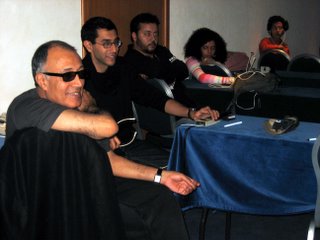Last Day of Class with Kiarostami
We hope from the bottom of our hearts that these great vibrations will continue in New York in April for the Tribeca Film Festival.




Ali Essafi: I wanted to say for the Moroccan students who are here, we are not used to the image as figurative.
As directors, what image can we make that comes from this culture, which does not have a long history of images? The image, or the figurative, is a notion that has remained foreign to us who are from the Arab-Muslim culture. It has only been a century, since colonization, that we have been confronted with the image through photographs and paintings. If a filmmaker like me wants to go back in time to understand his relation with images, there is nothing to attach to. When the cinema of Kiarostami appeared, it was a big thing for us. It is like the little Persian scenes with painted backgrounds and figurines, both realistic and imagined. I think that your work gives us this reference that helps us think about what images we could work with and present.
Kiarostami: Let me just say one thing too. I am very happy to have spent this week with all of you. I'm not just saying that. It doesn't really matter that if when I criticized the films we said it was good or bad. What's important now is this energy that is in you to create films. That's why I don't say that this meeting is our final meeting, because I don't think that this energy will come to an end so soon. Thus wherever I am, I am waiting for your films. I hope to make a small package out of them and the only way I can do that is with your help. Thus, I hope you accept that we watch these films and not criticize them or say anything. If anyone wants to know the effect of their film, I suggest they stand over there and watch the immediate reaction. That's it, thank you.




Ali Essafi: I wanted to say for the Moroccan students who are here, we are not used to the image as figurative.
As directors, what image can we make that comes from this culture, which does not have a long history of images? The image, or the figurative, is a notion that has remained foreign to us who are from the Arab-Muslim culture. It has only been a century, since colonization, that we have been confronted with the image through photographs and paintings. If a filmmaker like me wants to go back in time to understand his relation with images, there is nothing to attach to. When the cinema of Kiarostami appeared, it was a big thing for us. It is like the little Persian scenes with painted backgrounds and figurines, both realistic and imagined. I think that your work gives us this reference that helps us think about what images we could work with and present.
Kiarostami: Let me just say one thing too. I am very happy to have spent this week with all of you. I'm not just saying that. It doesn't really matter that if when I criticized the films we said it was good or bad. What's important now is this energy that is in you to create films. That's why I don't say that this meeting is our final meeting, because I don't think that this energy will come to an end so soon. Thus wherever I am, I am waiting for your films. I hope to make a small package out of them and the only way I can do that is with your help. Thus, I hope you accept that we watch these films and not criticize them or say anything. If anyone wants to know the effect of their film, I suggest they stand over there and watch the immediate reaction. That's it, thank you.

0 Comments:
Post a Comment
<< Home